Related Research Articles

James Monroe was an American statesman, lawyer, diplomat, and Founding Father who served as the fifth president of the United States from 1817 to 1825, a member of the Democratic-Republican Party. He was the last Founding Father to serve as president as well as the last president of the Virginia dynasty. His presidency coincided with the Era of Good Feelings, concluding the First Party System era of American politics. He issued the Monroe Doctrine, a policy of limiting European colonialism in the Americas. Monroe previously served as governor of Virginia, a member of the United States Senate, U.S. ambassador to France and Britain, the seventh secretary of state, and the eighth secretary of war.

Robert Carlyle Byrd was an American politician and musician who served as a United States senator from West Virginia for over 51 years, from 1959 until his death in 2010. A Democrat, Byrd also served as a U.S. representative for six years, from 1953 until 1959. He remains the longest-serving U.S. Senator in history; he was the longest-serving member in the history of the United States Congress until surpassed by Representative John Dingell of Michigan. Byrd is the only West Virginian to have served in both chambers of the state legislature and in both chambers of Congress.

Harry Flood Byrd Sr. was an American newspaper publisher, politician, and leader of the Democratic Party in Virginia for four decades as head of a political faction that became known as the Byrd Organization. Byrd served as Virginia's governor from 1926 until 1930, then represented the state as a U.S. senator from 1933 until 1965. He came to lead the conservative coalition in the Senate, and opposed President Franklin D. Roosevelt, largely blocking most liberal legislation after 1937. His son Harry Jr. succeeded him as U.S. senator, but ran as an Independent following the decline of the Byrd Organization.
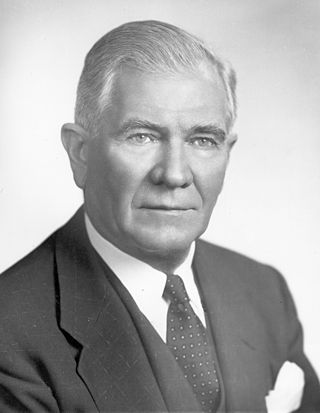
Absalom Willis Robertson was an American politician from Virginia who served in public office for over 50 years. A member of the Democratic Party and lukewarm ally of the Byrd Organization led by fellow U.S. Senator Harry F. Byrd, Robertson represented Virginia in the U.S. House of Representatives (1933–1946) and the U.S. Senate (1946–1966), and had earlier served in the Virginia General Assembly. A member of the conservative coalition during his congressional career, Robertson was a vocal opponent of civil rights. Robertson was also the father of televangelist and political commentator Pat Robertson.

The 1994 United States Senate elections were held November 8, 1994, with the 33 seats of Class 1 contested in regular elections. Special elections were also held to fill vacancies. The Republican Party took control of the Senate from the Democrats. Like for most other midterm elections, the opposition, this time being the Republicans, held the traditional advantage. The congressional Republicans campaigned against the early presidency of Bill Clinton, including his unsuccessful healthcare plan. Democrats held a 56–44 majority, after having lost a seat in Texas in a 1993 special election.

The 1976 United States Senate elections was an election for the United States Senate. Held on November 2, the 33 seats of Class 1 were contested in regular elections. They coincided with Democrat Jimmy Carter's presidential election and the United States Bicentennial celebration. Although almost half of the seats decided in this election changed parties, Carter's narrow victory did not provide coattails for the Democratic Party. Each party flipped seven Senate seats, although, one of the seats flipped by Democrats was previously held by a Conservative.
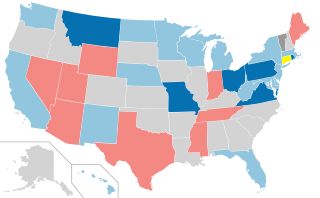
The 2006 United States Senate elections were held on November 7, 2006, with all 33 Class 1 Senate seats being contested. The term of office for those elected in 2006 ran from January 3, 2007, to January 3, 2013. Before the election cycle, the Republican Party controlled 55 of the 100 Senate seats.
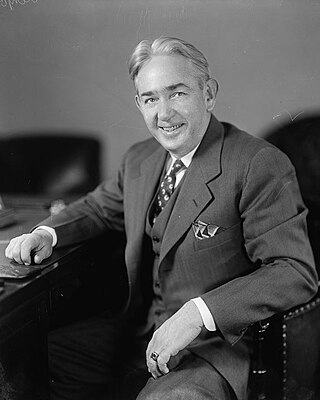
James Lindsay Almond Jr. was an American lawyer, state and federal judge and Democratic party politician. His political offices included as a member of the U.S. House of Representatives from Virginia's 6th congressional district (1946–1948), 26th Attorney General of Virginia (1948–1957) and the 58th Governor of Virginia (1958–1962). As a member of the Byrd Organization, Almond initially supported massive resistance to the integration of public schools following the United States Supreme Court decisions in Brown v. Board of Education, but when Virginia and federal courts ruled segregation unconstitutional, Almond worked with the legislature to end massive resistance.

The Byrd machine, or Byrd organization, was a political machine of the Democratic Party led by former Governor and U.S. Senator Harry F. Byrd (1887–1966) that dominated Virginia politics for much of the 20th century. From the 1890s until the late 1960s, the Byrd organization effectively controlled the politics of the state through a network of courthouse cliques of local constitutional officers in most of the state's counties.

The 2006 United States Senate election in West Virginia was held November 7, 2006. Incumbent Democrat Robert Byrd won re-election to a ninth term. He was sworn in on January 3, 2007. However, he died in office on June 28, 2010, before the end of his term. This was Byrd's closest re-election.
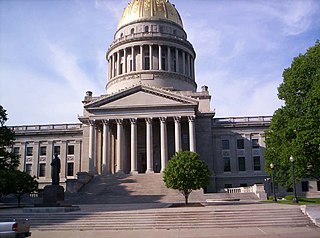
From the time of the Great Depression through the 1990s, the politics of West Virginia were largely dominated by the Democratic Party. In the 2000 presidential election, George W. Bush claimed a surprise victory over Al Gore, with 52% of the vote; he won West Virginia again in 2004, with 56% of the vote. West Virginia is now a heavily Republican state, with John McCain winning the state in 2008, Mitt Romney in 2012 and Donald Trump in 2016 and 2020.

John Reeves Raese is an American businessman and perennial Republican Party candidate for political office in West Virginia. He lost campaigns to represent West Virginia in the United States Senate in 1984, 2006, 2010, and 2012. He was also defeated in the Republican primary in the election for Governor of West Virginia in 1988.

Virginia's fifth congressional district is a United States congressional district in the commonwealth of Virginia. The 5th district includes the majority of Southside Virginia. Within the district are the cities of Charlottesville, Danville, and Lynchburg.

James Kenneth Robinson was a State Senator and U.S. Representative from Virginia.

The 2008 United States Senate election in West Virginia was held on November 4. Incumbent Senator Jay Rockefeller won re-election to a fifth term in a landslide, defeating Republican Jay Wolfe by a 27-point margin. Despite this overwhelming win, this remains the last time that a Democrat has won West Virginia's Class 2 U.S. Senate seat. In both of the two subsequent elections for the seat, Republicans have swept every single county.
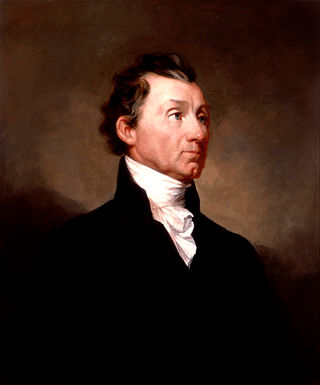
The presidency of James Monroe began on March 4, 1817, when James Monroe was inaugurated as President of the United States, and ended on March 4, 1825. Monroe, the fifth United States president, took office after winning the 1816 presidential election by an overwhelming margin over Federalist Rufus King. This election was the last in which the Federalists fielded a presidential candidate, and Monroe was unopposed in the 1820 presidential election. A member of the Democratic-Republican Party, Monroe was succeeded by his Secretary of State John Quincy Adams.

Electoral history of Robert Byrd, senior United States senator from West Virginia (1959–2010), president pro tempore of the United States Senate, Senate majority and minority leader (1981–1987). He was also the longest-serving U.S. senator in history, as well as the previous longest-serving member of Congress.

The 1994 United States Senate election in West Virginia was held November 7, 1994. Incumbent Democratic U.S. Senator Robert Byrd won re-election to a seventh term. He won every county and congressional district in the state.
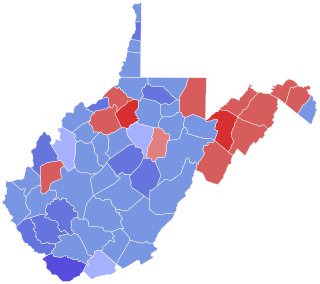
The 2010 United States Senate special election in West Virginia was held on November 2, 2010. Incumbent Democratic Senator Robert Byrd died in office on June 28, 2010. Democratic Governor Joe Manchin appointed Carte Goodwin to temporarily fill the vacancy. Goodwin pledged to not run for election to the seat in exchange for the appointment. This was the first open U.S. Senate seat in West Virginia since 1984 and the first in this seat since 1956. Manchin won the open seat and served out the remainder of Byrd's elected term, which ended on January 3, 2013.
Charles Monroe Oberly III is an American attorney from Delaware. He had served as United States Attorney for the District of Delaware from 2010 to 2017 and had served as Attorney General of Delaware from 1983 to 1995.
References
- ↑ "Stan Klos college stats". sports-reference.com. Sports Reference . Retrieved 8 September 2022.
- ↑ Amaro Harrys vs Jolly Colombani Archived 2007-11-27 at the Wayback Machine Pesaro, Italy 1978
- ↑ Amaro Harrys Jersey Amaro Harrys Bologna (Italian league) 1978-79
- ↑ Amaro Harry's Forward Archived 2007-11-27 at the Wayback Machine Bologna, Italy 1978
- ↑ USA Basketball Archived 2007-12-17 at the Wayback Machine Cartoon of Stan Klos Circa 1978
- ↑ PoliticalFest, "World's Fair of Politics" A Success in Philadelphia
- ↑ 'Rebels With a Cause' Opens at MGM A collection of rare historic documents from the founding days of the United States, MGM Grand Conference Center.
- ↑ "This Just In: The Constitution as Breaking News" JAMES MADISON'S MONTPELIER
- ↑ Rebels with a Cause Archived 2007-12-14 at the Wayback Machine By Bill Schackner, Post-Gazette Staff Writer Thursday, July 01, 1999
- ↑ Pennsylvania Society's Annual Awards Banquet 2004 Gold Medal Exhibit, Waldorf=Astoria
- ↑ James Monroe Birthplace Commission Archived 2007-10-13 at the Wayback Machine James Monroe Foundation established in 1928.
- ↑ Digging for buried History Archived 2007-12-17 at the Wayback Machine , The Free Lance-Star, Story by FRANK DELANO July 8, 2006.
- ↑ James Monroe Scholarship Award Archived 2007-12-12 at the Wayback Machine Established in 2001 by the James Monroe Foundation.
- ↑ "James Monroe Scholars". Archived from the original on 2007-11-11. Retrieved 2007-11-09.
- ↑ Dinosaur Safaris, Inc. Archived 2007-10-06 at the Wayback Machine Shell, Wyoming
- ↑ Local family business uncovers a dinosaur! Tampabay Channel 10, July 23, 2007
- ↑ Foraging For Fossils Good Morning America, By Pauline ArrillagavS H E L L, Wyo., Aug. 7, 2007
- ↑ PRESIDENT WHO? FORGOTTEN FOUNDERS 2004 Pittsburgh, Pennsylvania: Estoric, ISBN 0-9752627-5-0
- ↑ Roosevelt's legacy is "an inspiration' Archived 2007-07-31 at the Wayback Machine Worcester Telegram By Pamela H. Sacks Sunday, July 25, 2004
- ↑ Can't Recall 11th President? Got a Dollar? The New York Times By PETER APPLEBOME June 2, 2004
- ↑ USA TODAY Presidents of the United States January 28, 2004
- ↑ 2012 Cedar Key, Florida: Estoric,Inc ISBN 978-0975262740
- ↑ Carney, Mary (August 1, 2001). "Upper St. Clair archivist lends documents of Founding Fathers to library". Pittsburgh Post-Gazette . Retrieved 2007-09-25.
Klos envisions the Internet as an adjunct to learning and hopes to work with teachers and students in surfing the Web in search of classroom assignments. He has a Web site called Virtualology.com and has created sites for famous world leaders.
- ↑ USA Today Hot Sites, USATODAY.com 2001
- ↑ US Senate 1994 Archived 2010-10-28 at the Wayback Machine Byrd (D) versus Klos (R)
- ↑ Robert C. Byrd Letter to Stanley L. Klos Archived 2007-11-27 at the Wayback Machine October 31, 1997
- ↑ SUPREME COURT OF APPEALS OF WEST VIRGINIA West Virginia Trust Fund declared Unconstitutional February 25, 1997
- ↑ "Klos Took A Stand Based on What is Right" Archived 2007-11-27 at the Wayback Machine Wheeling News Redgister, West Virginia September 29, 1997